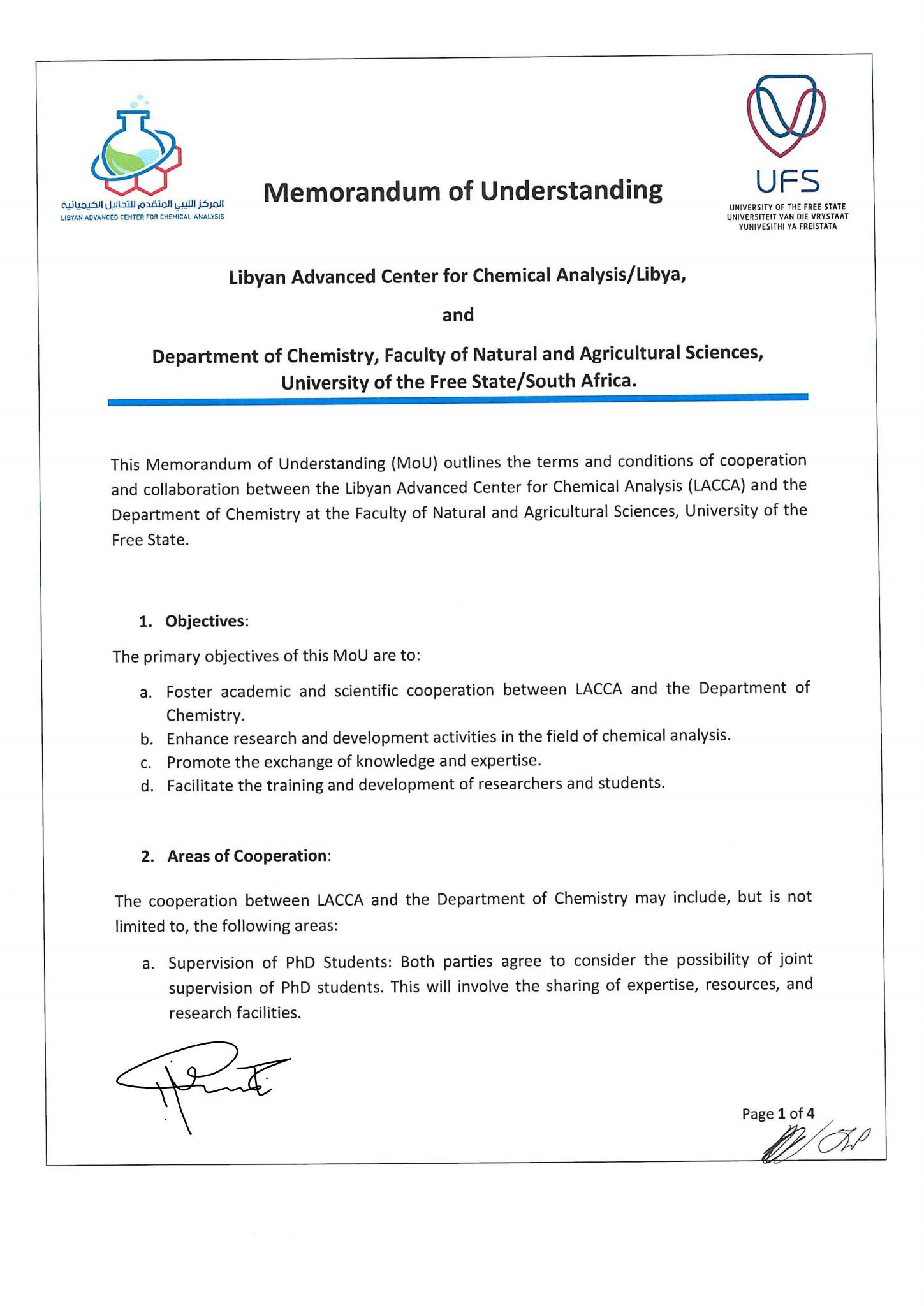
Signing of a memorandum of understanding between the Libyan Advanced Center for Chemical Analysis and the University of the Free State in South Africa: towards enhancing research and academic cooperation Memorandums of understanding between academic and research institutions in various countries are a valuable opportunity to enhance scientific and academic cooperation between participating parties. In this context, a memorandum of understanding was signed between the Libyan Advanced Center for Chemical Analysis and the University of the Free State in South Africa, with the aim of enhancing cooperation in joint research projects and exchanging scientific expertise and knowledge. This memorandum comes within the framework of enhancing scientific and academic cooperation between the two countries and achieving progress and development in the field of chemical sciences. Collaboration in joint research projects: The memorandum aims to enhance cooperation in the field of joint research projects between the Libyan Advanced Center for Chemical Analysis and the University of the Free State. The two sides will be able to implement joint research projects that contribute to developing scientific and technological knowledge in the fields of chemistry and chemical analysis. These projects will include advanced studies and innovative scientific experiments that solve current challenges and meet community needs. Cooperation in supervising joint master’s and doctoral projects: The memorandum is also an opportunity to enhance cooperation in the supervision of joint master’s and doctoral students between the two entities. Professors and researchers from the Libyan Advanced Center for Chemical Analysis and the University of the Free State will be able to work together in directing and following up on students’ scientific research, which contributes to developing their research capabilities and skills and achieving outstanding scientific results. Publishing in international journals in the first category: The memorandum also aims to enhance cooperation in the field of scientific publishing. Researchers and scientists from the Libyan Advanced Center for Chemical Analysis and the University of the Free State will be able to publish the results of their research and studies in first-class international journals. This will enhance the global vision of the center and the university and contribute to spreading knowledge and scientific discoveries in the field of chemistry. Joint consultations and lectures via Zoom: The memorandum also includes enhancing cooperation in exchanging experiences and knowledge by hosting joint consultations and lectures via the Zoom platform or other means of remote communication. Researchers and professors from both sides will be able to exchange ideas and information and discuss research challenges and recent scientific developments, which contributes to improving the quality of research and developing scientific knowledge. Exchange visits and conferences: The memorandum also includes cooperation in exchanging visits and participating in scientific conferences and seminars. Researchers and scientists from both sides will be able to visit research facilities and laboratories on the other side, and exchange expertise and scientific experiments. They will also have the opportunity to participate in conferences and seminars organized between the two sides, which contributes to expanding the network of scientific relations and communication between researchers and specialists. Conclusion: The signing of the memorandum of understanding between the Libyan Advanced Center for Chemical Analysis and the University of the Free State in South Africa represents an important step towards enhancing scientific and academic cooperation between the two countries. This memorandum will contribute to enhancing the capabilities of researchers and scientists and improving the quality of joint research and studies in the field of chemistry. It will also work to exchange experiences and knowledge and publish scientific results in prestigious international journals. In addition, the memorandum will provide opportunities for consultations, joint lectures, exchange of visits, and participation in conferences, which will enhance communication and cooperation between the two parties.

